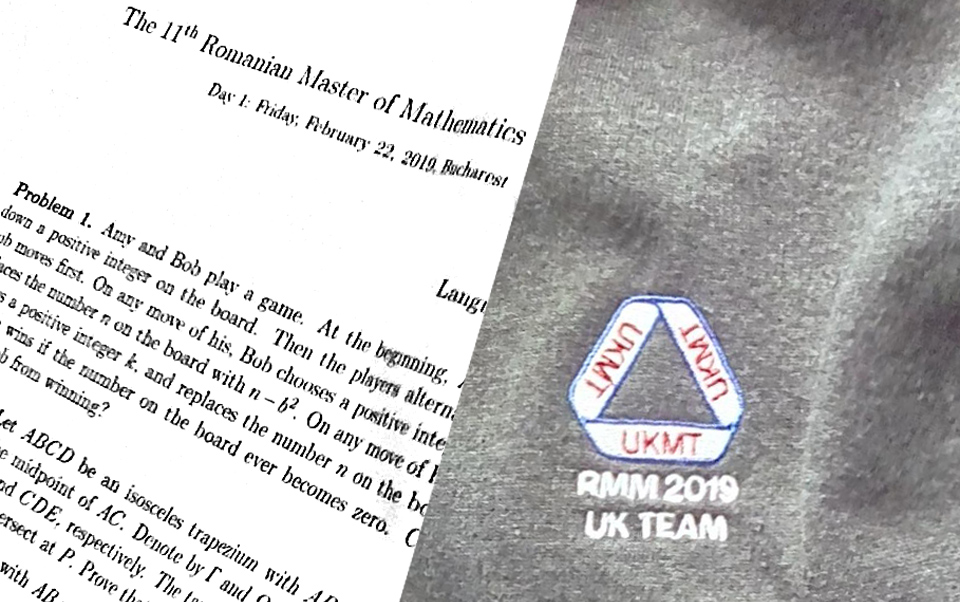In February 2019 I represented the UK at the Romanian Master of Mathematics (RMM), an international competition held annually in Bucharest, Romania. In this report I describe the process of being selected for the competition and my experience of the competition itself. I also talk about the UK Maths Trust, the organisation that organises and funds the UK’s team in the competition. They provide a variety of other opportunities and support for schools and individuals who are interested in maths.
In early November I sat the Senior Maths Challenge. This is a 1½-hour paper aimed at Years 11, 12 and 13 and can be entered by any school in the UK. Although this challenge is almost infinitely easier than the RMM, it can be thought of as the first step to selection for the competition because a high mark in it qualifies you for the British Mathematical Olympiad Round 1 (BMO1). I sat BMO1 in late November. Although it was the fifth time I had sat the paper, during the time I have been at my school nobody else there has ever qualified for BMO1. BMO1 consists of six questions each marked out of 10, and lasts 3½ hours. A good performance in BMO1 leads to qualification for the British Mathematical Olympiad Round 2 (BMO2). BMO1 is also the primary basis for selection for the UKMT’s training camp in Hungary.
After scoring 42/60 on BMO1, I was invited to the joint UK-Hungary training camp in Hungary (I also qualified for BMO2). 20 students from the UK and 20 students from Hungary go on this camp. The camp takes place over the New Year and consists of a variety of mathematical activities. There are a total of 19 hours of maths exams. On the basis of the exams in Hungary, I was selected for the RMM along with five other British students. It was the third time I had been on the Hungary Camp, but the first time I was selected for the RMM.
The UK also participates in other international mathematics competitions. Selection for these competitions will occur in April and May for 2019.
The Romanian Master of Mathematics consists of two exams on consecutive days, each lasting 4½ hours. Each exam consists of three questions in increasing order of difficulty. On the first day I got 7/7, 0/7, 1/7 respectively for the three questions. Unfortunately I got food poisoning between the first and second exams and was unable to participate on the second day. My total score of 8/42 earned me an honourable mention, an award given to anyone who gets full marks on at least one question but does not win a medal. Further details of the questions can be found on the UKMT’s website at https://bmos.ukmt.org.uk.
We arrived in Romania on 20th February, but the first exam wasn’t until 22nd February. This left a couple of days to participate in other activities that can be enjoyed in Bucharest. We attended a lecture on the subject of code theory, and we went to a museum of natural history. We were disappointed to find that the Museum of the Romanian Peasant was closed, as it had apparently been enjoyed by previous RMM teams. As well as the six students on the trip, we had a leader, a deputy leader, and an observer. The leader and deputy leader were frequently absent from our extracurricular activities as they were looking at the problems on the RMM paper to ensure that they were of approximately the right difficulty and worded correctly in all languages they had been translated into. The team leader’s report is available at https://www.imo-register.org.uk/2019-rmm-report.pdf and can also be reached via https://bmos.ukmt.org.uk.






